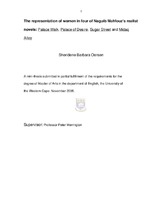| dc.contributor.advisor | Merrington, Peter | |
| dc.contributor.author | Oersen, Sheridene Barbara | |
| dc.contributor.other | Faculty of Arts | |
| dc.date.accessioned | 2013-07-17T12:15:46Z | |
| dc.date.available | 2007/04/19 08:47 | |
| dc.date.available | 2007/04/19 | |
| dc.date.available | 2013-07-17T12:15:46Z | |
| dc.date.issued | 2005 | |
| dc.identifier.uri | http://hdl.handle.net/11394/1663 | |
| dc.description | Magister Artium - MA | en_US |
| dc.description.abstract | This thesis involved the various discourses around Egyptian novelist Naguib Mahfouz's representation of women in four of his most well-known novels, which were originally written in Arabic. At the one extreme, he is described as a feminist writer who takes up an aggressive anti-patriarchal stance, delivering a multi-faceted critique on Egyptian society. Mahfouz's personal milieu, as well as the broader social context in which he finds himself, was given careful consideration. It was also considered whether the genre in which the four novels have been written has a significant influence on the manner in which Mahfouz has represented his female characters. | en_US |
| dc.language.iso | en | en_US |
| dc.publisher | University of the Western Cape | en_US |
| dc.subject | Maòhfåuòz | en_US |
| dc.subject | Najåib | en_US |
| dc.subject | Women in literature | en_US |
| dc.subject | Arabic literature - themes | en_US |
| dc.subject | Feminism | en_US |
| dc.subject | Egypt history | en_US |
| dc.title | The representation of women in four of Naguib Mahfouz's realist novels: Palace walk, Palace of desire, Sugar street and Midaq alley | en_US |
| dc.type | Thesis | en_US |
| dc.rights.holder | University of the Western Cape | en_US |
| dc.description.country | South Africa | |

